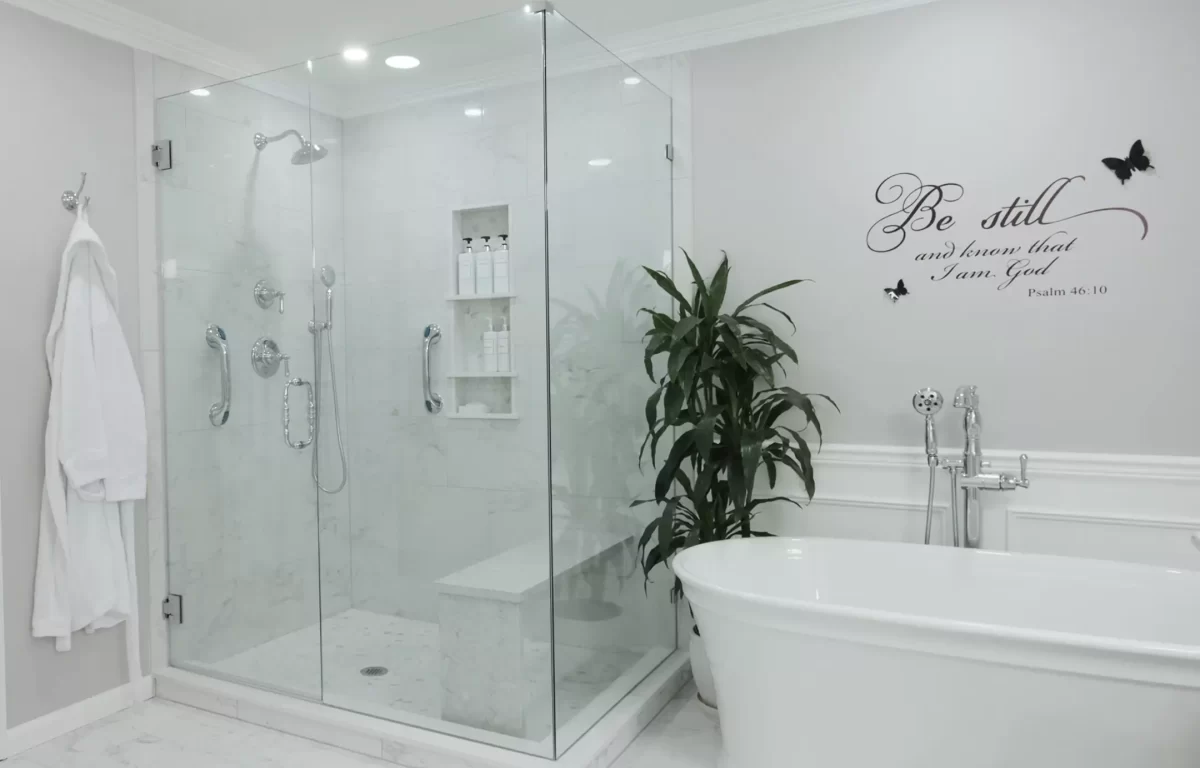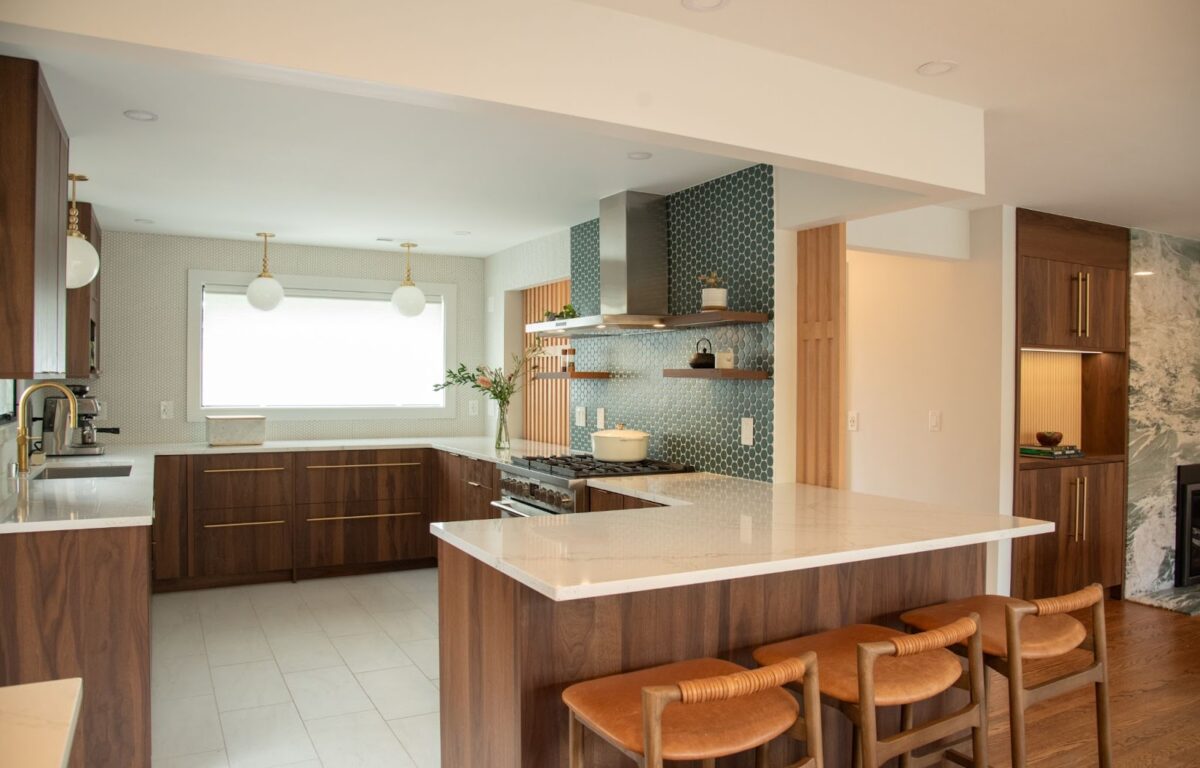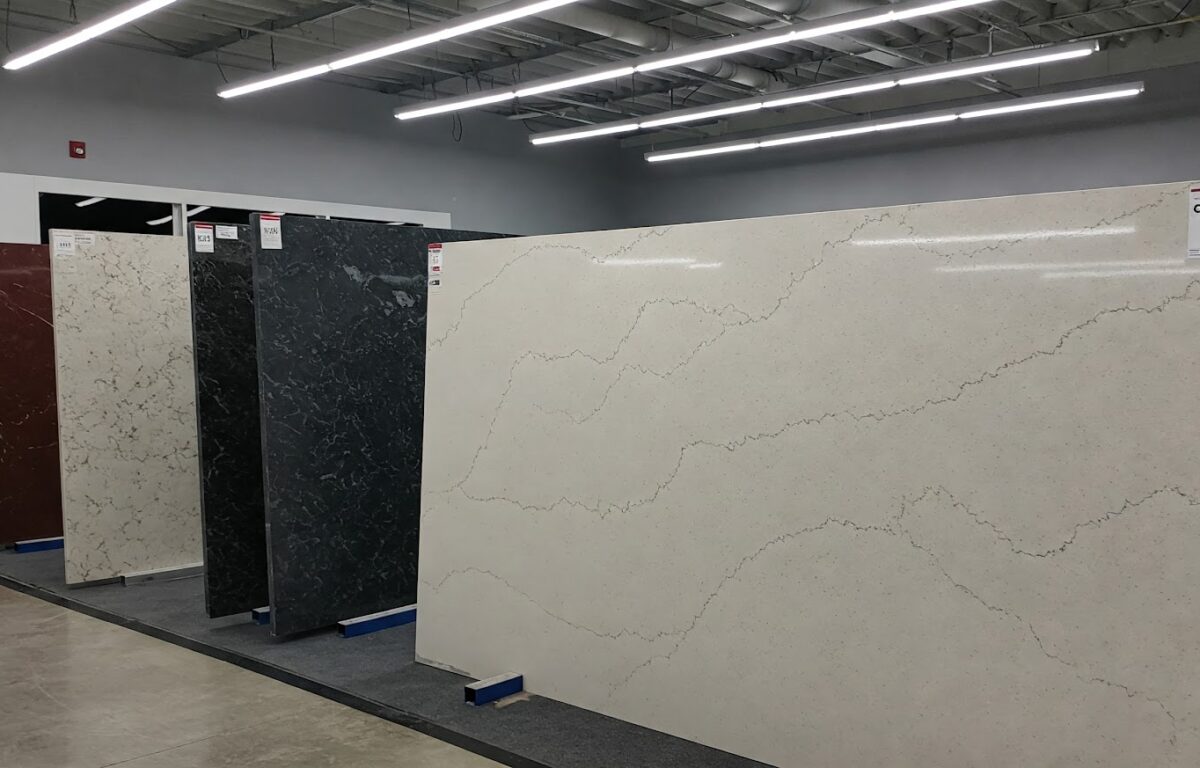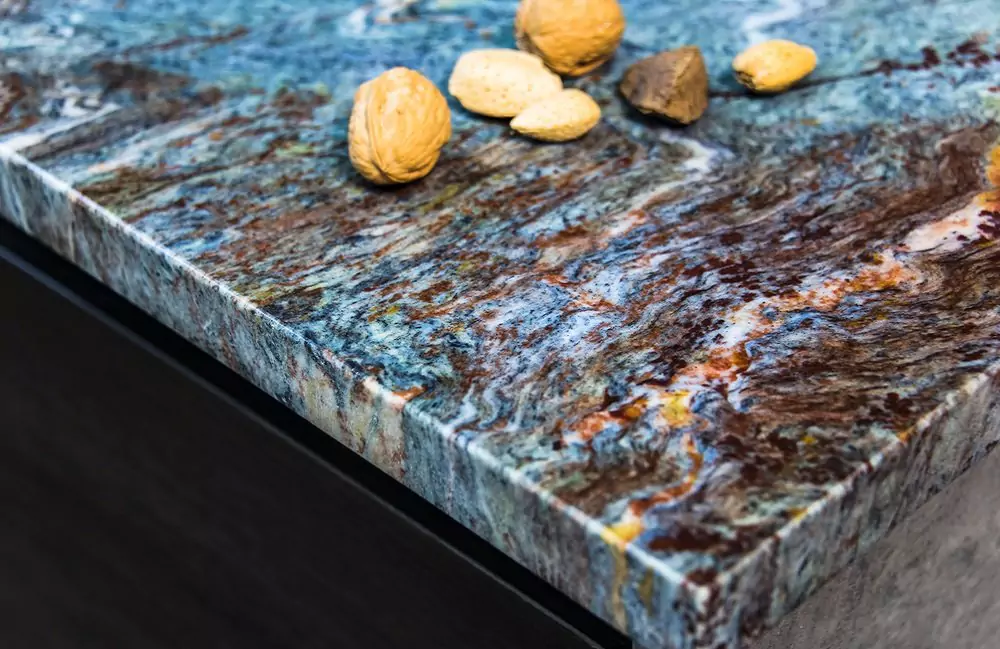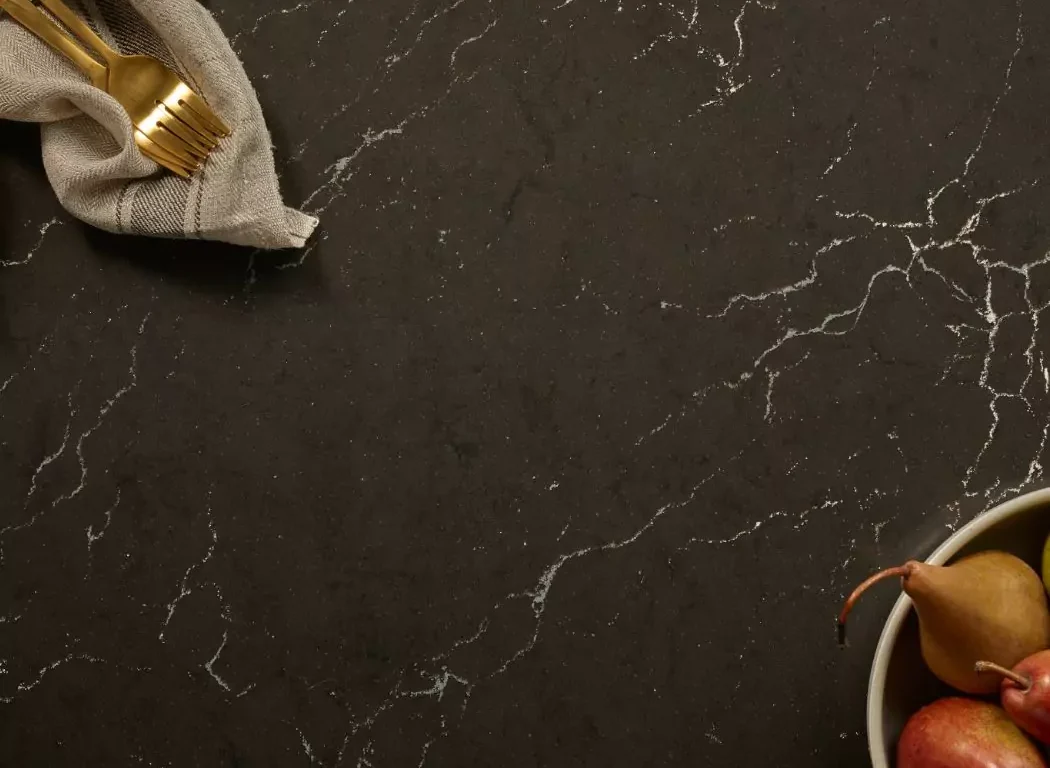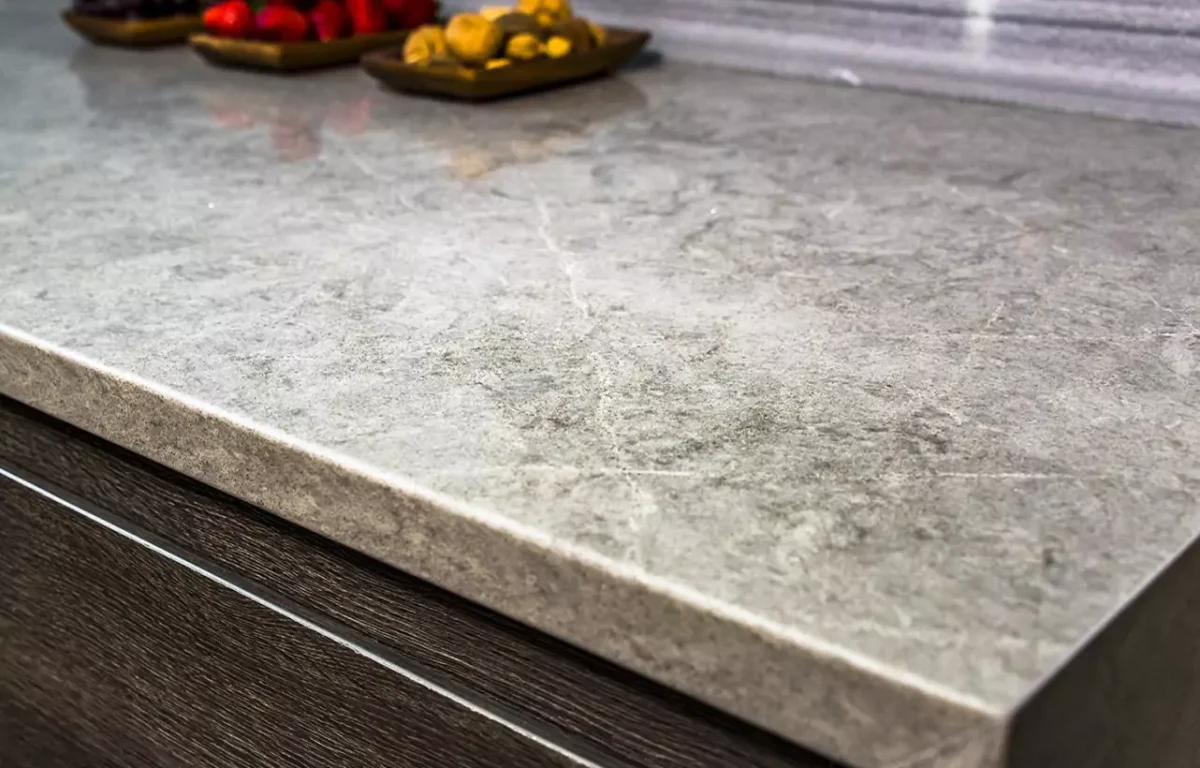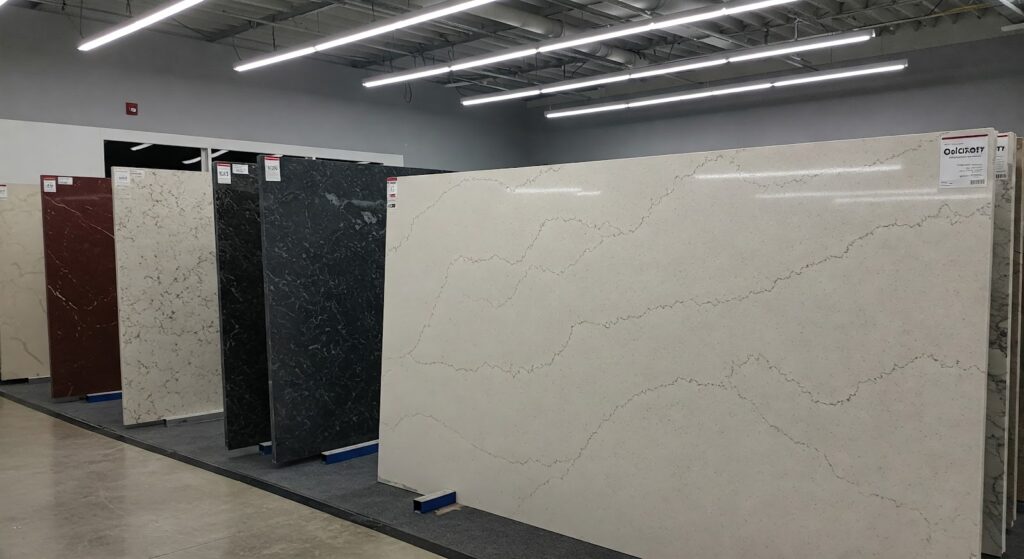
What Are Quartz Countertops Made Of?
Quartz countertops belong to the category of engineered stone. They combine finely crushed natural quartz with resin and pigments:
- Quartz content: Most brands use between 88 % and 95 % ground quartz by weight.
- Binders and colorants: The remaining 5 % to 12 % consist of polymer resins, pigments, and sometimes recycled glass or metallic chips for visual flair.
- Non‑porous finish: Manufacturers compress the mixture under vacuum and heat, creating a dense slab with virtually zero water absorption, a key reason quartz resists staining and bacteria without needing sealers.
Quartz ranks 7 on the Mohs hardness scale, which makes it tougher than granite and highly scratch-resistant. The resin adds flexural strength, which helps prevent cracks and structural failure under everyday pressure.
In remodeling markets like Seattle, homeowners are increasingly drawn to materials that perform well without frequent upkeep. During a typical Seattle kitchen remodel, quartz offers a practical solution that handles moisture, spills, and impact better than natural alternatives, especially in homes with open-concept kitchens or heavy foot traffic.
At Kitchen & More, we help clients select from a wide range of quartz options sourced from trusted U.S. suppliers. Quartz slabs typically come in 2 cm and 3 cm thicknesses to support a variety of edge profiles and installation needs. Our design consultants walk homeowners through these specifications during the selection process, aligning material choice with how each space is actually used.
When homeowners in Bellevue and Seattle decide to upgrade their kitchens or bathrooms, they want a surface that stands up to everyday use and still looks fresh years later. In Seattle, a full kitchen renovation now averages around $62,000, with high-end projects reaching up to $175,000. These costs reflect the demand for premium materials like quartz countertops, which are favored for their durability and low maintenance needs.
Quartz remains a top choice among our clients. It is an engineered surface made from about 90 to 95 percent natural quartz and 5 to 10 percent resin and pigments. This combination produces a dense, nonporous slab that resists stains, chips, and moisture without requiring annual sealing. That reliability makes it a strong fit for homes in the Pacific Northwest, where wet conditions and active households are common.
Benefits of Quartz Countertops
Now that you understand how quartz countertops are engineered, it’s important to look at what that construction actually offers in daily use. Unlike natural stone, which can be inconsistent and porous, quartz delivers practical advantages that go beyond surface appearance.
1. Long-lasting under daily wear
Quartz stands up to everyday use without showing early signs of wear. It resists scratches from knives, scuffs from pots, and general surface damage. The material holds up well in both residential and commercial settings, which speaks to its strength.
2. Stain protection and low absorption
Because quartz is non-porous, it blocks out spills that would otherwise soak into granite or marble. Common stains like red wine, coffee, and tomato sauce wipe away without leaving a trace. This makes quartz a smart choice in homes with children, pets, or heavy kitchen use.
3. Simple cleaning routine
No sealing or special products are needed to maintain quartz. Homeowners clean it with soap and water or a mild surface cleaner. The surface doesn’t absorb bacteria or moisture, which cuts down on mold risk in both kitchens and bathrooms.
4. Ideal for high-moisture bathrooms
In Bellevue, homeowners typically spend $10,000 to $25,000 on a bathroom remodel. Many projects include quartz countertops because homeowners want durable, low-maintenance surfaces that resist moisture around sinks and showers in the Pacific Northwest climate. This makes quartz a smart choice for bathroom remodeling in Bellevue.
5. Built to handle everyday pressure
While it’s not immune to heat, quartz resists moderate temperatures and blunt impacts better than many natural stones. The added resin content gives it more give than brittle granite, so it’s less likely to chip at the edges or corners when hit.
6. Strong resale appeal
Quartz countertops continue to rank high on homebuyer wish lists. In higher-end remodels, they often serve as a selling point. The surface stays looking new for years and rarely requires repair, which justifies the initial investment over time.
Pros and Cons of Quartz Countertops

Quartz has gained popularity for its stability and performance, but it’s not without trade-offs. Below is a focused breakdown of where this material excels—and where it can fall short—based on what we’ve seen in hundreds of remodeling projects.
Pros
1. Resists water damage over time
In humid environments or near plumbing, quartz holds up. Unlike porous stone, it doesn’t absorb water, so there’s no risk of hidden swelling or warping behind cabinets or around sinks.
2. Low upkeep, high payoff
Many of our clients choose quartz because they don’t want a maintenance routine. No resealing, no special polishes, and no worry about staining from acidic foods or cosmetics.
3. Reliable color and pattern
Natural stones can vary wildly, even from slab to slab. Quartz offers predictability. For projects involving multiple surfaces, such as islands and vanities, this consistency matters.
4. Design compatibility
Because it’s manufactured, quartz comes in a wide range of finishes, from matte to polished, and colors that work well with both modern and traditional spaces.
5. Adds resale confidence
Buyers see quartz as a long-term surface that doesn’t need early replacement. It’s one of the few features in a remodel that combines practicality with broad market appeal.
Cons
1. Not built for high heat
Place a hot pot or curling iron directly on the surface, and you risk discoloration. The resin component in quartz can’t tolerate intense, direct heat.
2. Requires expert handling
Quartz isn’t fragile, but it’s heavy and needs exact leveling. DIY installs often end in callbacks. That’s why we assign trained installers with experience in structural layout.
3. Price range can surprise homeowners
Quartz isn’t the cheapest surface on the market. Most slabs cost between $60 and $100 per square foot installed, depending on the brand, thickness, and edge treatment. Premium designs with complex patterns or waterfall edges can push that number even higher. In the Seattle area, where full bathroom remodels often run between $35,000 and $97,000, countertops are one of the top three cost drivers.
If you’re planning a Seattle bathroom remodel, expect quartz to represent a meaningful share of your budget, but one that pays off with longevity and low maintenance.
4. Visible seams in large layouts
Large spans, like U-shaped countertops or full-height backsplashes, often require seams. While skilled installers can align patterns well, the joins are still noticeable up close.
5. Indoor-only material
UV exposure will fade or yellow resin-based countertops. Quartz works best inside, where sunlight and temperature swings are limited.
Durability of Quartz Countertops
Quartz countertops are built for longevity. Their engineered structure produces a dense, stable surface that resists impact and holds up well in high-use spaces. In real-world conditions, quartz often outlasts natural stone because it doesn’t chip as easily at the corners or edges.
Unlike granite or marble, quartz doesn’t have microscopic pores that absorb water. This makes it a reliable choice around sinks, dishwashers, and bathroom fixtures where long-term moisture exposure can compromise other materials. On average, quartz weighs about 20 pounds per square foot, which means the cabinets beneath need to be structurally sound and properly supported. At Kitchen & More, we assess the base cabinetry and reinforcements during the planning phase to prevent long-term issues like warping or shifting.
Clients often remark how solid and quiet their kitchens feel after switching to quartz—no hollow echoes, no shifting, just a sturdy work surface that stays in place.
Ready for Quartz? Talk to the Experts at Kitchen & More
Quartz countertops combine strength, consistency, and low upkeep in a way that fits how most people actually use their kitchens and bathrooms. Unlike natural stone, quartz doesn’t require sealing, and it resists the kinds of everyday damage that slowly wear down other materials. It’s not perfect, but for most indoor applications, it performs reliably for years.
At Kitchen & More, we help homeowners choose quartz for both practical and design reasons. Our clients appreciate that they’re investing in a surface that won’t require constant maintenance or expensive repairs. If you’re thinking about remodeling and want a countertop that works as hard as you do, quartz is a smart place to start.
